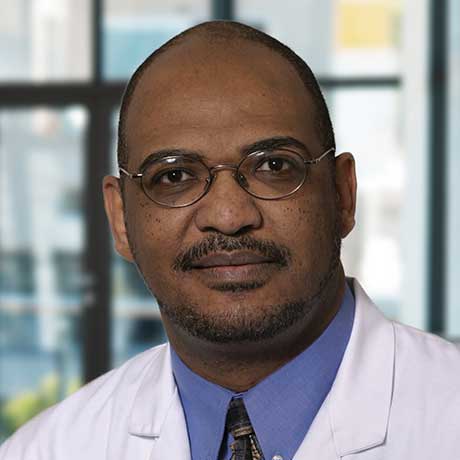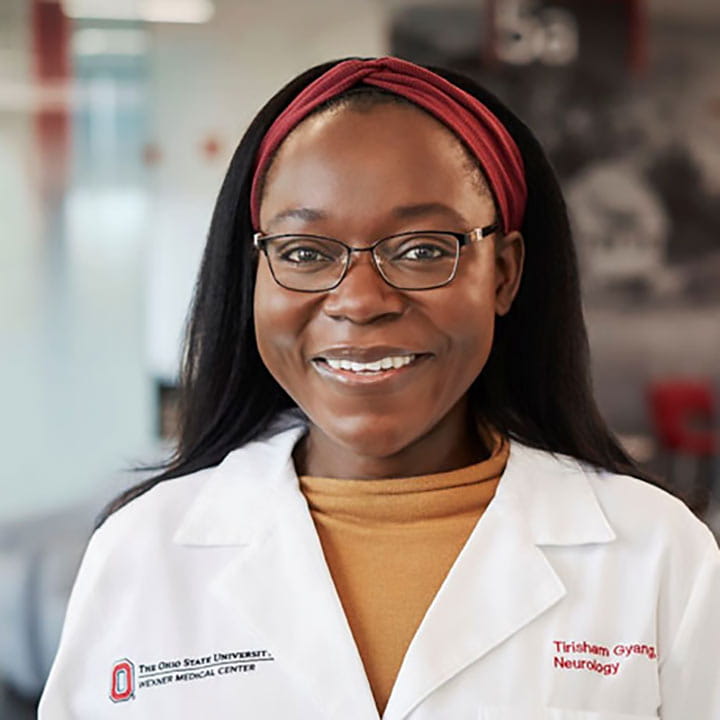Advancing science through transformative clinical research
Clinical research enables our medical professionals to understand mechanisms that lead to new solutions. Once those solutions are developed, clinical trials ensure they are safe and ready for use among those who need them.
Douglas Scharre, MD
Early detection of Mild Cognitive Impairment (MCI) and dementia using cognitive assessments, biomarkers, and functional neuroimaging.
 The Ohio State University Memory Disorders Research Center is working on groundbreaking research projects with the very real potential to help patients afflicted with cognitive disorders and dementia. Researchers study disease modifying drugs designed to remove tau and amyloid (both proteins that are toxic and kill brain cells) or reduce inflammation from the brains of patients with Alzheimer’s disease (AD) and mild cognitive impairment (MCI). Anti-amyloid therapies are being used for those at risk for AD. An innovative approach to treat early AD and MCI with first in human AAV2-BDNF gene therapy is being investigated. Researchers also are testing new drug treatments for those with Lewy body disease and are conducting a study to discover novel imaging and sleep characteristics that will help with early diagnosis. Improvements of our cognitive assessment tools (eSAGE), used across the world, utilizing artificial intelligence methods are being evaluated. Additional clinical trials are underway to study treatments to improve brain health and problem behaviors seen in dementia.
The Ohio State University Memory Disorders Research Center is working on groundbreaking research projects with the very real potential to help patients afflicted with cognitive disorders and dementia. Researchers study disease modifying drugs designed to remove tau and amyloid (both proteins that are toxic and kill brain cells) or reduce inflammation from the brains of patients with Alzheimer’s disease (AD) and mild cognitive impairment (MCI). Anti-amyloid therapies are being used for those at risk for AD. An innovative approach to treat early AD and MCI with first in human AAV2-BDNF gene therapy is being investigated. Researchers also are testing new drug treatments for those with Lewy body disease and are conducting a study to discover novel imaging and sleep characteristics that will help with early diagnosis. Improvements of our cognitive assessment tools (eSAGE), used across the world, utilizing artificial intelligence methods are being evaluated. Additional clinical trials are underway to study treatments to improve brain health and problem behaviors seen in dementia.
Bakri Elsheikh, MD
 Dr. Elsheikh’s main clinical research focus is the study of outcome measures and experimental therapeutics in individuals with neuromuscular disease—in particular, spinal muscular atrophy (SMA) and muscular dystrophies. Dr. Elsheikh holds a particular interest in the field of electro-diagnostic studies’ role as an outcome measure in clinical trials, and a special interest in autoimmune neuromuscular disorders such as myasthenia gravis, autoimmune inflammatory neuropathies and myositis.
Dr. Elsheikh’s main clinical research focus is the study of outcome measures and experimental therapeutics in individuals with neuromuscular disease—in particular, spinal muscular atrophy (SMA) and muscular dystrophies. Dr. Elsheikh holds a particular interest in the field of electro-diagnostic studies’ role as an outcome measure in clinical trials, and a special interest in autoimmune neuromuscular disorders such as myasthenia gravis, autoimmune inflammatory neuropathies and myositis.
Sandra Kostyk, MD, PhD
Improving our understanding of neurodegenerative disorders, exploring new symptomatic treatment options, and studying potential disease modifying treatment strategies.
 Dr. Kostyk’s research team is using novel approaches to treat Parkinson’s disease and Huntington’s disease. Working closely with neurosurgeon colleagues, these scientists are studying the safety and effectiveness of using modified viral vectors to transfer genes into the brains of individuals with these disorders. They’re currently enrolling individuals with advanced Parkinson’s disease who have motor fluctuations in a study aimed at replacing an enzyme that’s essential for converting levodopa to dopamine, a molecule that deficient in Parkinson’s disease. They’re also starting a new trial transferring a gene that will help brain cells produce GDNF, a growth factor that has the potential to benefit Parkinson’s patients and and slow the course of the disease. And they’re participating in a novel approach to modify the course of Huntington’s disease by the infusion of a viral vector linked to a gene that can silence the mRNA instructions that make the Huntingtin protein that causes this devastating disorder.
Dr. Kostyk’s research team is using novel approaches to treat Parkinson’s disease and Huntington’s disease. Working closely with neurosurgeon colleagues, these scientists are studying the safety and effectiveness of using modified viral vectors to transfer genes into the brains of individuals with these disorders. They’re currently enrolling individuals with advanced Parkinson’s disease who have motor fluctuations in a study aimed at replacing an enzyme that’s essential for converting levodopa to dopamine, a molecule that deficient in Parkinson’s disease. They’re also starting a new trial transferring a gene that will help brain cells produce GDNF, a growth factor that has the potential to benefit Parkinson’s patients and and slow the course of the disease. And they’re participating in a novel approach to modify the course of Huntington’s disease by the infusion of a viral vector linked to a gene that can silence the mRNA instructions that make the Huntingtin protein that causes this devastating disorder.
Yinan Zhang, MD
Understanding associations of biological aging with outcomes and immune dysregulation in multiple sclerosis
 Dr. Zhang’s clinical and translational research is centered on aging in multiple sclerosis (MS). Age carries the highest risk for developing progressive MS, yet the underlying cellular, molecular, and genetic processes contributing to biological aging are understudied in MS. Dr. Zhang’s studies aim to understand how aging modifies disease course in MS by examining mechanisms of biological aging in people with MS and their associations with clinical and neuroimaging outcomes as well as immune dysfunction. The goal is to establish a geroscience framework for studying disease progression in MS that can lead to trials of anti-aging therapies and combined treatment strategies targeting both MS and aging processes.
Dr. Zhang’s clinical and translational research is centered on aging in multiple sclerosis (MS). Age carries the highest risk for developing progressive MS, yet the underlying cellular, molecular, and genetic processes contributing to biological aging are understudied in MS. Dr. Zhang’s studies aim to understand how aging modifies disease course in MS by examining mechanisms of biological aging in people with MS and their associations with clinical and neuroimaging outcomes as well as immune dysfunction. The goal is to establish a geroscience framework for studying disease progression in MS that can lead to trials of anti-aging therapies and combined treatment strategies targeting both MS and aging processes.
Specific grants awarded: R03
Miriam Freimer, MD
The neuromuscular division research goals aim to understand more about the nature of neuromuscular diseases: how they impact the muscles and nerves of our patients and to develop treatments that will help to mitigate or alleviate our patient’s symptoms.
 Dr. Freimer’s specific research interests center on better understanding of and the development of treatments for autoimmune diseases that can damage the nerves, muscles or the neuromuscular junctions. She has participated in groundbreaking national and international research that has brought several new treatments to the field. In particular, until recently there were no FDA approved medications for the treatment of myasthenia gravis. There are now 3 medications available and hopefully more to come in the next 1-2 years. In addition to multiple trials of treatments for myasthenia gravis, she is also conduction research in the treatment of autoimmune neuropathies such as CIDP and immune mediated myopathies such as necrotizing myopathy and dermatomyositis. She conducts research in potential therapies for inclusion body myositis, FSH dystrophy, and myotonic dystrophy.
Dr. Freimer’s specific research interests center on better understanding of and the development of treatments for autoimmune diseases that can damage the nerves, muscles or the neuromuscular junctions. She has participated in groundbreaking national and international research that has brought several new treatments to the field. In particular, until recently there were no FDA approved medications for the treatment of myasthenia gravis. There are now 3 medications available and hopefully more to come in the next 1-2 years. In addition to multiple trials of treatments for myasthenia gravis, she is also conduction research in the treatment of autoimmune neuropathies such as CIDP and immune mediated myopathies such as necrotizing myopathy and dermatomyositis. She conducts research in potential therapies for inclusion body myositis, FSH dystrophy, and myotonic dystrophy.
Tirisham Gyang, MD
Experimental neurotherapeutics in neuroimmunology and characterization of neurotoxicity related to cancer immunotherapy.
 Dr. Gyang’s main research interests focus on investigating new and novel therapeutics for demyelinating conditions such as multiple sclerosis, neuromyelitis optica, myelin oligodendrocyte glycoprotein antibody disease (MOGAD), and non-demyelinating CNS inflammatory conditions such as autoimmune encephalitis, neurosarcoidosis, neuropsychiatric lupus, etc. She is currently recruiting patients for clinical trials in multiple sclerosis and NMDA receptor encephalitis. Dr. Gyang is also setting up a novel clinical/research program to investigate neurotoxicity related to immune cancer therapy including CAR T and immune checkpoint inhibitors.
Dr. Gyang’s main research interests focus on investigating new and novel therapeutics for demyelinating conditions such as multiple sclerosis, neuromyelitis optica, myelin oligodendrocyte glycoprotein antibody disease (MOGAD), and non-demyelinating CNS inflammatory conditions such as autoimmune encephalitis, neurosarcoidosis, neuropsychiatric lupus, etc. She is currently recruiting patients for clinical trials in multiple sclerosis and NMDA receptor encephalitis. Dr. Gyang is also setting up a novel clinical/research program to investigate neurotoxicity related to immune cancer therapy including CAR T and immune checkpoint inhibitors.
Erica Dawson, PhD, ABPP-CN
Cognitive and quality of life correlates of neurological conditions and treatment outcomes.
 Dr. Dawson's research focuses on translational outcomes associated with neurological and other medical disorders, including brain tumors, metastatic cancers, and multiple sclerosis. She works collaboratively with physician colleagues to identify biomarkers of illness severity that may inform future treatment targets and approaches, with the intent of minimizing burden on cognition and quality of life. For example, she is actively recruiting participants for a clinical trial assessing differences in cognitive outcomes associated with standard of care for brain metastases versus alternative therapy approaches (i.e., whole brain radiation, memory-sparing radiation, and stereotactic radiosurgery). She is also recruiting participants to evaluate the effectiveness of a novel cognitive rehabilitation approach to treating adults with cognitive complaints. Dr. Dawson collaborates with colleagues in Neurology, Radiation Oncology, Psychiatry, and Pathology.
Dr. Dawson's research focuses on translational outcomes associated with neurological and other medical disorders, including brain tumors, metastatic cancers, and multiple sclerosis. She works collaboratively with physician colleagues to identify biomarkers of illness severity that may inform future treatment targets and approaches, with the intent of minimizing burden on cognition and quality of life. For example, she is actively recruiting participants for a clinical trial assessing differences in cognitive outcomes associated with standard of care for brain metastases versus alternative therapy approaches (i.e., whole brain radiation, memory-sparing radiation, and stereotactic radiosurgery). She is also recruiting participants to evaluate the effectiveness of a novel cognitive rehabilitation approach to treating adults with cognitive complaints. Dr. Dawson collaborates with colleagues in Neurology, Radiation Oncology, Psychiatry, and Pathology.
Specific grants awarded: The Ohio State University Patient Care Innovation Award (2021-2024)
Rochelle O’Neil, PhD
Effectiveness of a new approach to cognitive rehabilitation.
 Dr. O'Neil recently joined OSU and so far is involved in a study measuring the effectiveness of a new approach to cognitive rehabilitation. She is also integrated into the Neurology department's Memory Division with plans to contribute to projects led by this team.
Dr. O'Neil recently joined OSU and so far is involved in a study measuring the effectiveness of a new approach to cognitive rehabilitation. She is also integrated into the Neurology department's Memory Division with plans to contribute to projects led by this team.
